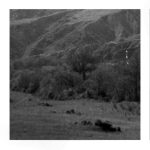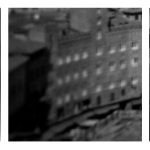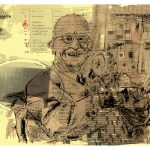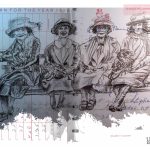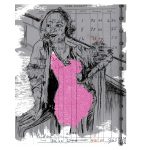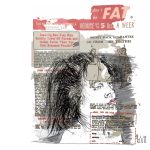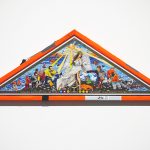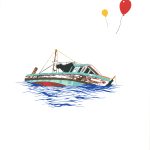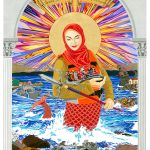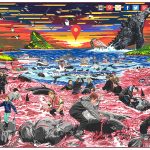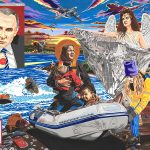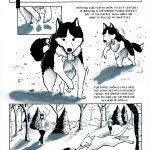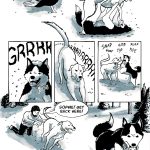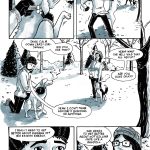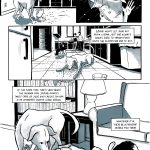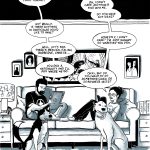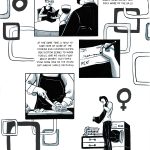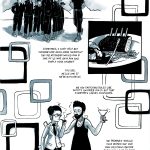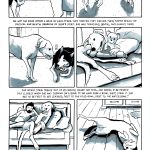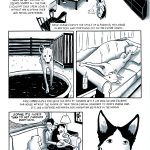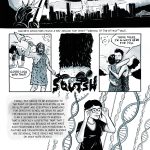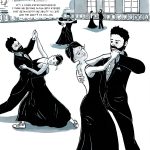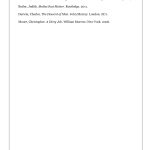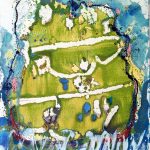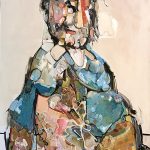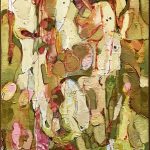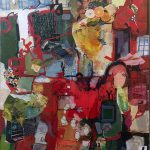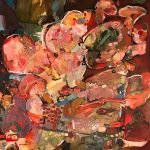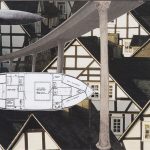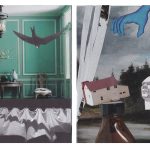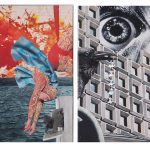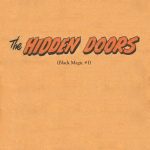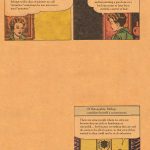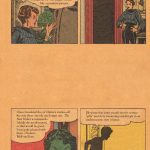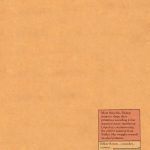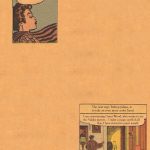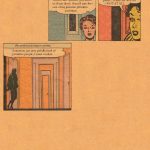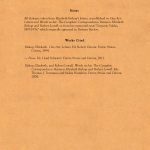The house sits among a sea of crabgrass and dandelions gone to seed. Weeds choke beds once lined with neat rows of colorful tulips and daisies. Scarecrow fingers reach through cracks in concrete walkways. Everything browns, dying in the broil of the valley. It is what happens when the timed sprinklers shut down and the lawnmowers stop, when the regular applications of fertilizer and pesticides end. When the people leave.
Aaron knows he has arrived without checking the address. These neighborhoods are homogenous: white stucco ranches with red clay roofs, small trimmed lawns watered at 6 a.m. daily, boxwood shrubs under bay windows. They are the same house, pressed from a mold, the address numbers a sole identifying characteristic. The empty ones stand out, scabs on an otherwise flawless complexion.
He comes for the discarded. The foreclosed. This one, a ranch-style house with a patch of wilted rosebushes in its front yard, sits on a cul-de-sac wound deep into the suburban maze. Aaron parks on the street and climbs out of his pickup truck, a clipboard in his left hand. A man watering shrubs in front of the house on the right approaches as Aaron walks toward the front door. The man clutches the dripping nozzle of a green vinyl hose at his right side.
“Isn’t anybody there,” the man says as Aaron approaches. “They were long gone before the bank put up the notice.”
“I’m aware,” Aaron says. He hands the man one of the cards he keeps on his clipboard. “I’m here to inspect the property. Mind if I ask a few questions?”
“Not at all.”
“How long have they been gone?”
“Six months. Nice people. Moving van just showed up one day.”
It always does, Aaron thinks. Nobody publicizes giving up the house. Some just can’t afford the payments, because they lost jobs or the rates on their mortgages ballooned. Others simply decide to walk away after years of watching the value of their homes plummet. Either way, it ends the same: the moving vans arrive and drive away. The only question is whether they wait for the foreclosure notice—for the Sheriff’s deputies to arrive and escort them from the property—or slink away before it is hammered to their doors.
The neighbor frowns. “Seems like more and more houses have those notices posted. It’s not good for the neighborhood.”
“I’d imagine not,” Aaron says. “Does it seem like anybody’s messed with the property? Anything unusual?”
“Nope.”
“Animals?”
“How do you mean?”
“Did they have any pets?”
The neighbor shakes his head. “No. No pets.”
Aaron thanks the man, turns and approaches the house. The front windows are covered by drapes. There is no lockbox on the door, meaning the locksmith hasn’t come. This isn’t a surprise. His employer, First Western Financial, is drowning in repossessed houses. There are usually problems coordinating all the contractors needed to handle the properties—the locksmiths and cleaners, haulers and handymen, painters and realtors.
Aaron’s job is to scout the homes, to inspect for property damage and itemize any furniture, appliances, or other debris left behind. He catalogues couches and televisions, washers and dryers, desks, tables and chairs. He finds bicycles, books, paintings, children’s toys and hundreds of other flotsam and jetsam that people see fit to leave behind. Today, inside the house on the cul-de-sac, there will likely be more to add to the list. He first needs to get in.
He tries the front door. Locked. The front windows and garage door do not budge. A tall wooden fence frames both sides of the house, blocking his view of the sides and rear. If there are any weak spots—a window left unlatched or a hidden key the owners forgot—they’ll be back there.
Aaron finds a gate along the fence on the left end of the house. He reaches over the top to dislodge the latch and peeks inside before moving further.
He knows to be cautious. Surprises lurk behind these fences.
The first window he tries after entering the yard is unlocked. He removes the screen and lifts himself in, stepping into an empty bedroom. Aaron finds nothing as he walks between rooms aside from empty picture hooks on the walls. There are vacuum marks in the carpet. Sometimes they clean, unable to leave behind an untidy home. Others abandon houses in shambles: holes in the walls, junk strewn across the floor and yard, stinking of cat urine and other odors. Aaron wonders whether these people live in such conditions or simply trash the place as a final insult toward the bank.
He’s always thankful for clean ones.
There is a dollhouse in a small pink bedroom. It is about five feet long and as tall as Aaron’s waist. Three levels of tiny white rooms sit below the house’s powder blue roof, each stripped as bare of furniture as the larger house in which it sits. He guesses it didn’t fit in the truck. He imagines a father kneeling next to a little girl, surrounded by boxes, both clearing the dollhouse of its contents. The father promises the girl they will come back for it or that he will build her a new one for her new bedroom.
He lifts the clipboard, clicks his pen. Writes dollhouse, large under Miscellaneous Items. Moves on to the garage.
—
One house is abandoned. Then another. Then two more, three, four. Each foreclosure devalues the neighborhood. Homeowners watch prices plummet, stare at the balances owed on their own mortgages, calculate how long it will take to break even. Whether it is worth paying anymore. Too many owe too much for properties that won’t fetch a fraction of what is needed to sell. Desperate sellers unload million-dollar homes for $500,000 or less. The panic spreads. The banks print more notices.
Before the crash, there is the boom. Stockton is a crumbling port in the middle of a wide, dry valley, sitting an hour’s drive east of San Francisco. The coast is flush with money from the Silicon Valley, but land is at a premium. People look inland, where acreage is available and housing inexpensive, to erect castles displaying their wealth. Builders descend upon the region, buying up land, drawing blueprints, planning subdivisions. Orchards and pastures disappear, paved over, covered with houses, houses, houses. Prices rise with every property sold. Home values double, triple. Owners borrow against this newfound wealth, put in pools, take vacations, buy luxury cars. Houses become investments, part of a portfolio.
Aaron works with granite, installing kitchen countertops in new and existing homes. Business is brisk. Once one owner has the stone installed, everyone in the neighborhood follows. The pitch is easy: Granite is nearly as strong as a diamond, is scratch- and stain-resistant, non-porous. Instant equity. It sells itself.
He buys a house and a new car. Goes on vacations. Gets married and has a child.
Then the economy turns. Construction ends. People stop buying. Aaron stays afloat as homeowners remodel their kitchens in desperate attempts to sell. Those calls then stop coming. Granite becomes a luxury most can no longer afford. The business folds.
He goes to work for First Western to pay the bills. In the evenings, he takes classes at the local community college in search of a new career. The books sit stacked on the passenger seat of his truck so he can study between jobs: Introductory Statistics, Accounting, Ancient Civilizations. It is the last text he can’t keep away from. He takes the course out of a fascination that began years earlier, during a day-trip to the Mayan ruins on a vacation to Mexico. It’s a great puzzle to him: Societies rise, erect spectacular cities, develop customs and innovations, only to disappear. There are those with which he is already familiar: The Aztecs and Incas, the Romans and Mesopotamians. But there are also dozens of others, like Clovis, Nabta Playa, the Minoans. He daydreams about visiting the remnants one day, when each paycheck isn’t necessary to keep the lights on at home.
His wife returns to work, waiting tables during lunch shifts at a local restaurant. Anna is still in uniform when he arrives home after today’s inspections, a large red stain spread across her white buttoned-down shirt. She has dark circles under her eyes. The gray shows beneath her blonde tied-back hair. It reminds him of his own age, the lines deepening on his face, his dark hair thinning, the way his knees ache in the morning.
“Have an accident?” he asks, pointing out the stain.
“Marinara. I was covered in spaghetti.”
“Nice.”
“I wore it all day.”
“Good for tips, right?”
Anna shakes her head, pulls out a small fold of cash. Forty-seven dollars. Aaron kisses her forehead, tells her to take a bath and relax, he’ll get ready for when Robert comes home from school. He doesn’t tell her about the dollhouse. She’ll want to take and sell it. It’s not stealing, she says. They’re not coming back for them. He knows she’s right, but can’t bring himself to do so.
It feels like going through the pockets of the dead.
Forty-seven dollars. He’ll have to pick up some inspections during the weekend. There are times when they fall behind, when the notices and phone calls begin. He worries the bank will take his house as well.
He enters the kitchen, pulls bread, mustard and lunchmeat from the refrigerator and begins making sandwiches—one for himself, one for his son. He cuts the crusts from Robert’s sandwich directly on the granite countertop. No need for a cutting board.
—
There is a passage in Aaron’s textbook about a culture dead five thousand years . The Cucuteni-Trypillian society’s settlements stretch across a wide expanse of Eastern Europe, with some growing as large as fifteen thousand people. They plant and harvest agriculture and raise livestock, make tools and pottery and clothing, hunt for food, and develop a religion. Yet every six or seven decades—once a lifetime?—these enormous villages are mysteriously burned to the ground and built new. Is it a sacrifice to the gods? A ritual of renewal? Why build a home only destroy it?
—
The empty houses are an invitation to the lost, the addicted, the fugitive and forgotten. They break windows and nest, stripping the house of fixtures and anything else that can be sold. Liquor bottles and beer cans litter the floors, burn marks from cigarettes and crack pipes in the carpets. Remnants of meth labs: two-liter bottles, plastic buckets, and long tubes, countless emptied packets of Sudafed tablets.
Sometimes people are there when Aaron arrives. The first time this happens is in an impoverished neighborhood in city’s southern end. He enters the house and finds two men—ghosts, emaciated, covered in scabs—hastily disassembling a makeshift lab. One of the men pulls a knife and sneers. Aaron turns and runs.
There are others: Drunks who ask for change or offer Aaron a beer when he enters the home. Taggers who cover every inch of wall space, inside and out, with graffiti. In one neighborhood, a kid who goes by the tag SURGE! hits every vacant house—at least two dozen.
He now calls the police whenever he’s suspicious about a house. He now carries pepper spray. But they still sneak up from time to time. One day he finds a thin young man sitting with his back against the wall in the living room of an empty duplex. The man is unconscious, chin resting against chest, a syringe and blackened spoon lying at his side. The paramedics say he’ll be fine as they cart him away on a gurney. Aaron writes it up on his clipboard, itemizes the paraphernalia left on the floor.
—
The Harappan civilization has as many as five million people living in its cities and villages in what today is South Asia. Its borders are filled with complex brick-and-mortar buildings, its web of streets equipped with sophisticated drains that carry waste from homes to sewage disposal areas. It is a center of agriculture and astronomy, commerce and craftsmanship, pioneering technology that remains in use today.
It is all abandoned, nearly one thousand years before the founding of Rome. Only the streets and buildings remain.
—
He is called to an older neighborhood east of downtown. Aaron’s notes say sheriff’s deputies removed the owner a week before in anticipation of a foreclosure auction. He approaches the lock box at the front door. It is clear that someone is living there when he enters. A blanket and pillow lie on the carpet in the front room, along with a small radio. Empty soup cans neatly line the kitchen countertop. Aaron pulls the pepper spray from his belt and quietly walks from room to room.
She is in a closet in the back bedroom, an old woman, the tips of her short gray curls barely reaching Aaron’s chest. She winces when he opens the door, eyes on the pepper spray. He puts it away, helps her out.
Her name is Mrs. White. The home is hers—was hers, until the previous week, when the bank changed the locks and her daughter took her to a retirement home. The story is common: her son encourages her to take a loan on the home’s rising value, telling her she is sitting on a goldmine. She loses it when his investments fail and can no longer keep up with payments.
“I told the people at the home I was visiting a friend,” she says.
She’s hidden there for five days.
Aaron calls Mrs. White’s daughter. He tells her he won’t call the police on the condition that her mother does not return. He cleans up evidence of her stay, omits it from his report. He wonders how long the bank will sit on the place, how little they’ll eventually take to unload it on some investor looking to flip for a profit.
Whether it could have more value to anyone but the woman who has to be evicted twice.
—
The city of Petra is carved into the sides of desert cliffs in what today is Jordan. Its buildings are etchings, like sandcastles turned on their sides: columns, arches, friezes and pediments mirroring the architecture of ancient Greece, coupled with statues of various gods and beasts. These masterpieces are facades for a network of ventilated, underground tunnels and chambers. It is a city that takes lifetimes to build.
It is a work of art, a labor of love. Its people are gone.
—
The house is in a neighborhood where vacancies are a virus. Everybody’s gone. Entire streets in foreclosure, each house empty and abandoned, real estate signs advertising “Bank Owned” properties posted on browning lawns. This is most common in the new neighborhoods, the ones where investors buy up blocks of homes as rentals, or the developer can’t get rid of the properties once the market crashes. Aaron’s surprised at the lack of vandalism as he drives down the street—usually the taggers and squatters quickly claim such areas.
This house is at the end of the block. It is the white stucco-red tile design, the old standby. It appears to have been empty for months. No lock box. Of course.
He climbs a graying wood fence. The first thing he sees is the doghouse, sitting next to the side of the house near the backyard. It is wood with a black shingle roof. The name Buster is posted above the front door.
The moment his feet touch the other side of the fence he smells the decay, hears the buzz of the flies. To his right, in the corner between the fence and the house, lies a dog. Long dead. Picked apart by scavengers, leaving only dark brown fur and bones behind. That and a black collar, still around its neck, attached to a long chain leading from the doghouse.
Aaron presumes the tag he sees dangling from the collar also says Buster.
He turns away, covers his mouth and nose. Then he notices. The fence. The claw marks. The blood. They cover nearly the entire inner surface of the fence, cascading down from as high as five feet off the ground, some cuts as deep as half an inch. Inside one of the gashes, Aaron sees a single black claw, torn from Buster’s paw. He imagines the dog lunging at the fence, flailing, trying to climb or knock it down until his paws grow raw and bloody. Trying to rejoin his family. The chain tensing behind him, yanking him back with each attempt at escape. The dog’s eventual surrender, curling up in a corner, thirsty, hungry. Alone.
Aaron sinks to the ground, sitting with his back along the fence opposite the house, his eyes on the curled figure before him. There are bowls near the doghouse, presumably for food and water, long empty and dry. He wonders how long the dog lasted, how long Buster survived once he lapped up the water in those bowls. Days. A week. Longer. Howling prayers to an abandoned neighborhood. Dying steps from a doghouse built and personalized just for him.
The owners likely moved someplace that did not allow dogs—an apartment, perhaps, or a relative’s house. Aaron wants to find them, deliver their dog’s corpse to their doorstep, a housewarming gift for their new hearth. He wants to chain them to this doghouse in the summer heat, leave them with nothing but a fast-evaporating bowl of water. He wants them to see what they’ve done.
He contacts First Western about tracking down the former owners, pressing charges for animal cruelty. He takes pictures to the sheriff’s office, gives them whatever information he has. He is assured: We will do what we can. He knows what little that means.
—
The Olmec in Mexico build communities around massive pyramids, courts, monuments, and statues. The Aksumites in Ethiopia coin money and erect stone obelisks that stretch toward the sky. The Anasazi develop an agricultural society in the southwestern United States, chiseling their own settlements into the region’s red clay cliffs.
Empty. Empty. Empty.
—
The trip to Mexico often replays in Aaron’s mind when he lies in bed or drives from house to house, like a home video on a loop: There is the dusty gray bus, rumbling along a cratered dirt road running inland from the coast. He and Anna are younger, only just married, not yet parents. They sit near the front, taking pictures out of a cloudy side window. Eventually, the great stone ruins of Chichen Itza come into view.
Aaron walks in the shadow of the ancient gray structures, awed at their size and craftsmanship. He wanders through the Great Ball Court, once a gathering place for Mayan athletes and spectators. He examines the Temple of the Warriors, a tiered pyramid surrounded by long rows of carved columns honoring the bravest of the civilization’s people. He inspects El Caracol, the domed stone observatory offering a view of the starry night sky.
At the center of the site sits El Castillo, a massive four-sided pyramid stretching nearly a hundred feet above the ground. Aaron climbs the tall stairs that run up all four sides like wide waterfalls. He turns at the peak and sits on the top step, staring out at the sunbaked ruins below. He imagines this place in its prime: A bustling square filled with cattle herders, traders, farmers with baskets of grain and produce. The shouts of merchants vying for customers and haggling over prices. People playing games, cheering, laughing. He wonders why they’ll leave, whether it is war, drought, famine, or disease that forces them to leave their kingdom behind.
He asks: Where did everyone go?
It is this that now gnaws at him. Each empty house reminds him of those Mayan ruins. The homes are abandoned, just like those of the Anasazi, and Harappa, and Petra and so many others. Left to crumble.
Aaron imagines the Mayan ruins beginning with one or two vacant houses. People watch neighbors go and follow, sparking an exodus, emptying more and more homes. Fewer stay to reap the harvest, bake bread, hunt game. Those who remain die off or fade away. Only the buildings survive.
Where did everyone go? Aaron can’t stop asking the question. The houses he inspects each day no longer have minivans in the driveway and bicycles on the front lawn. The smell of Sunday barbecues and fresh cut grass is gone. The people have vanished. He wonders if the houses will ever again be filled, if the foreclosures will continue until there is nobody left. One home becomes three, streets turn to blocks, blocks to communities. All of it empty. Landscape erodes, dust gathers, wildlife returns. Hundreds, thousands of years pass. Archaeologists delicately brush dirt from plastic big wheels, DVD players, picture frames. From giant, empty dollhouses. Tourists come with cameras, snapping photographs, buying T-shirts and key chains. Vacationing in the suburban ruins, the remnants of America.
Aaron pulls up to the first of seven houses on today’s schedule. The front door is locked. He approaches the fence, unlatches the gate and slips inside, unsure what he will find on the other side.


